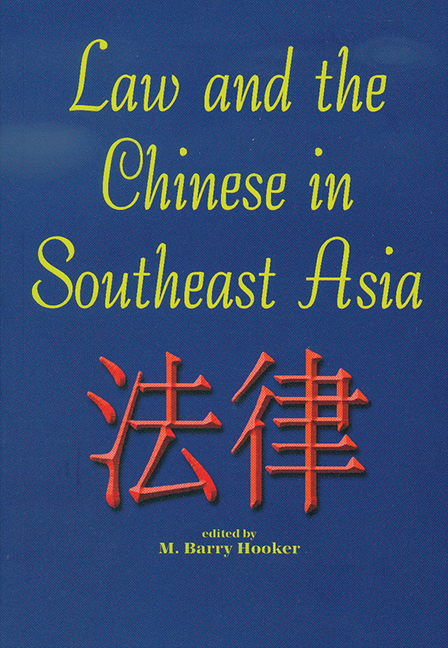Book contents
- Frontmatter
- Contents
- Preface
- The Contributors
- 1 Law and the Chinese Outside China: A Preliminary Survey of the Issues and the Literature
- 2 The Legal Position of the Ethnic Chinese in Indochina under French Rule
- 3 Law and Memory, De Jure to De Facto: Confucianization and its Implications for Family and Property in Vietnam
- 4 English Law and the Invention of Chinese Personal Law in Singapore and Malaysia
- 5 The Indonesian Chinese: “Foreign Orientals”, Netherlands Subjects, and Indonesian Citizens
- 6 Chinese Family Firms in Indonesia and the Question of “Confucian Corporatism”
- 7 China's Citizenship Law and the Chinese in Southeast Asia
- Index
5 - The Indonesian Chinese: “Foreign Orientals”, Netherlands Subjects, and Indonesian Citizens
Published online by Cambridge University Press: 21 October 2015
- Frontmatter
- Contents
- Preface
- The Contributors
- 1 Law and the Chinese Outside China: A Preliminary Survey of the Issues and the Literature
- 2 The Legal Position of the Ethnic Chinese in Indochina under French Rule
- 3 Law and Memory, De Jure to De Facto: Confucianization and its Implications for Family and Property in Vietnam
- 4 English Law and the Invention of Chinese Personal Law in Singapore and Malaysia
- 5 The Indonesian Chinese: “Foreign Orientals”, Netherlands Subjects, and Indonesian Citizens
- 6 Chinese Family Firms in Indonesia and the Question of “Confucian Corporatism”
- 7 China's Citizenship Law and the Chinese in Southeast Asia
- Index
Summary
The legal position of the ethnic Chinese in Indonesia has been a tangled web for more than a century. The ramifications persist to the present day. For example, in 1979–80 the Coordination Body for the Chinese Problem of the State Intelligence Coordination Body (BKMC-BAKIN or Badan Koordinasi Masalah Cina — Badan Koordinasi Intelijen Negara) published a voluminous compilation of legislation (including various regulations and decrees as well as Acts of Parliament) with reference to the Chinese in Indonesia (BAKIN 1979–80). Notwithstanding the declared determination of the government under President Abdurrachman Wahid to abolish all legislation which discriminated against the ethnic Chinese, most if not all of the legislative products set out in the three volumes of the BKMC-BAKIN publication remain technically in force.
Aspects of the historical background of the present situation might be thought to be well-known, but a closer inspection reveals that the story is more complex and contested than is usually assumed. This chapter first re-examines the history of the legal category “Foreign Orientals” and then relates the history of “foreign” Netherlands subjects to that of Indonesian citizens of “foreign” descent.
EUROPEANS, NATIVES, AND FOREIGN ORIENTALS
It is one of the lesser-known curiosities of legal history that the planned introduction by the Republic of China around 1930 of a new Civil Code for China was the direct cause of the recruitment of a group of 75 young Dutch law graduates for service in the Netherlands Indies judiciary. The reason for this was the belief in some official quarters that the Code, which was to include a new system of family law, might have the effect of automatically redefining the status of all Chinese in the Netherlands Indies, so that they were classified as “Europeans” rather than “Foreign Orientals”. This would in turn require a massive increase in the number of European judges employed in the colony because criminal cases involving Chinese would thenceforth have to be heard by the Raad van Justitie (European Court of Justice) rather than the Landraad (Native Court).
When I first started to study Indonesian history about thirty-five years ago, it was a commonplace observation that the colonial government had classified the population of the Netherlands Indies into three groups (bevolkingsgroepen), namely, Europeans, Natives (Inlanders), and Foreign Orientals (Vreemde Oosterlingen).
- Type
- Chapter
- Information
- Law and the Chinese in Southeast Asia , pp. 131 - 149Publisher: ISEAS–Yusof Ishak InstitutePrint publication year: 2002



